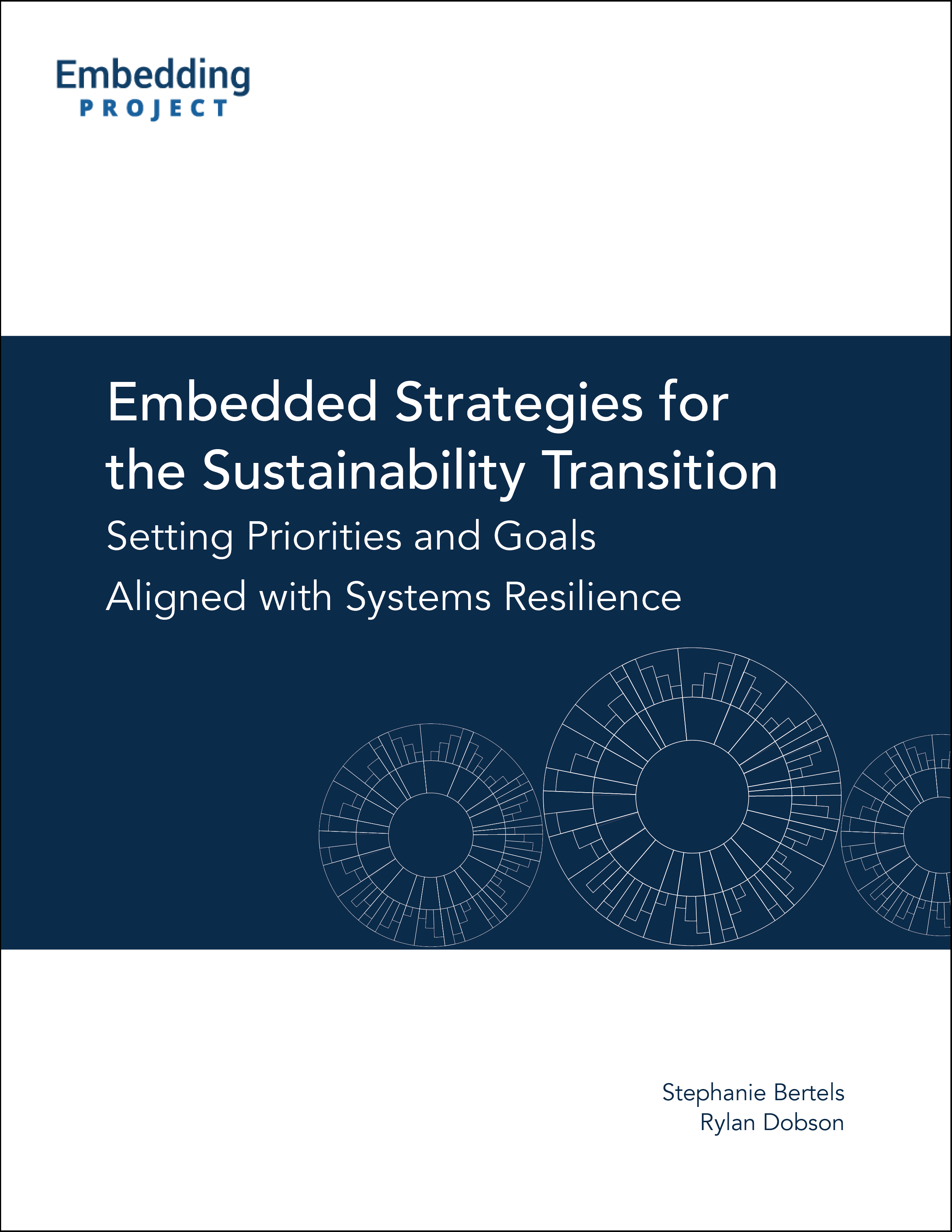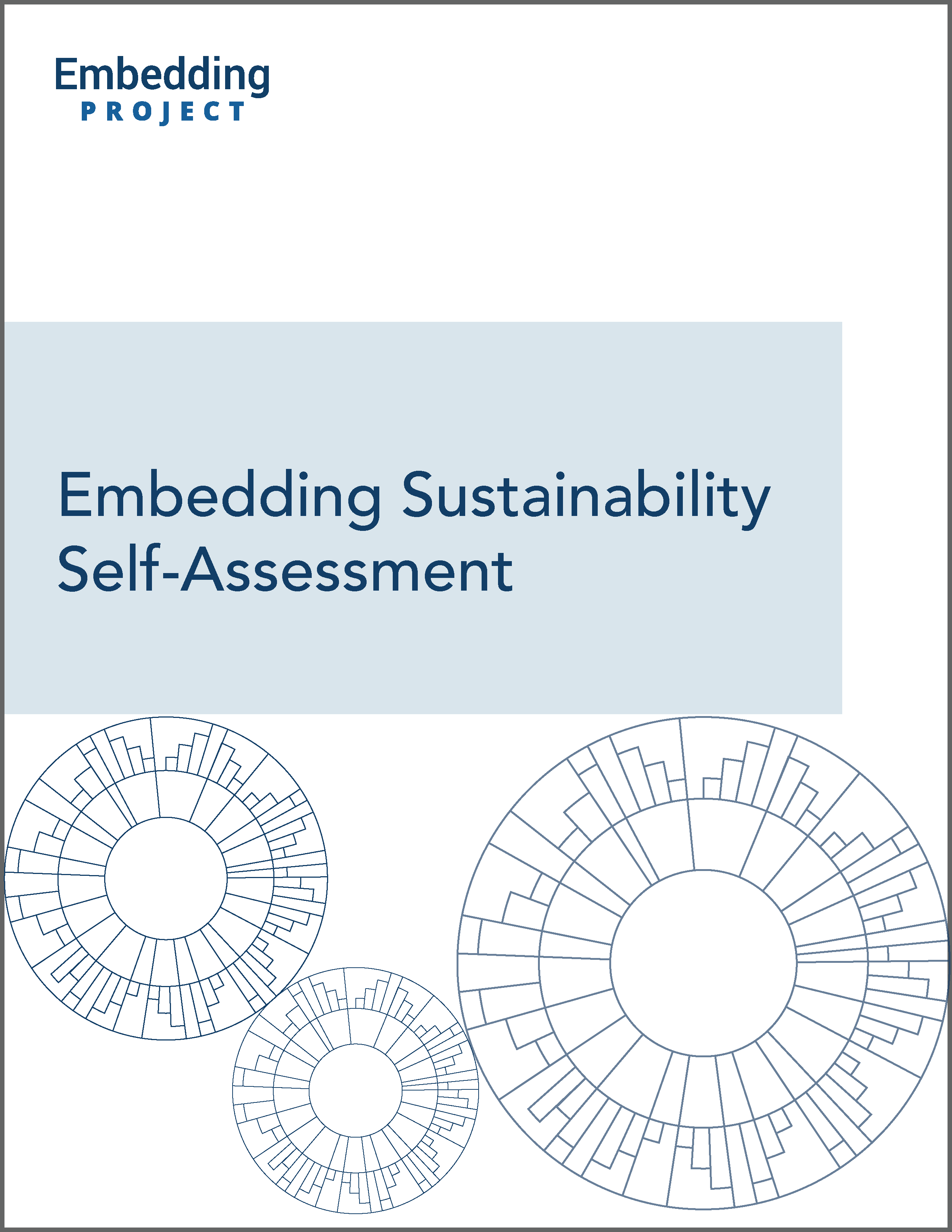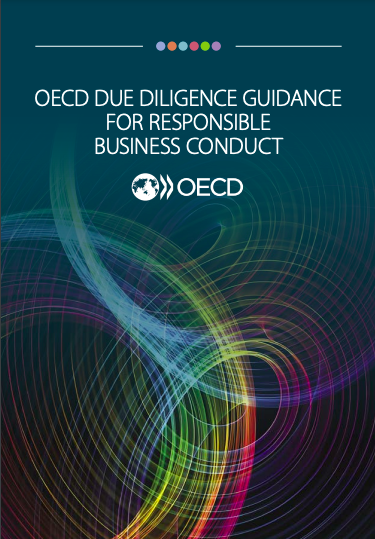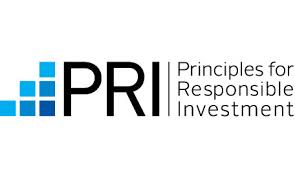General Resources
Description
Introductory resources and reference materials to help acquaint you with the issue of governance and ethics.
Share this Subissue on:LinkedIn
Resources
Embedded Strategies for the Sustainability Transition
It is time for companies to take a very different approach to corporate strategy.
Our Embedded Strategies guide helps companies respond to the growing calls for businesses to articulate their purpose and their strategy in alignment with the need to shift the global economy towards the reduction of inequality, a rapid climate transition, the preservation of biodiversity, and the elimination of waste.
This guide will help you to develop a contextual strategy and goals that ensure your company is doing its part to maintain the resilience of key social and environmental systems.
Building on our Road to Context guide with insights from 300+ interviews with senior executives, CEOs, board chairs, and directors, as well as our experiences supporting companies around the world, it outlines resources and tactics that can help your company to scan for emerging issues and risks; understand their implications for your business; understand your impacts and your potential for positive influence; prioritise where it makes sense to direct your efforts; and set your strategy and goals in alignment with delivering systems value.
Embedding Sustainability Self-Assessment
Interested in understanding your own company's journey? Consider undertaking this free, preliminary practices self-assessment.
OECD Due Diligence Guidance for Responsible Business Conduct
These guidelines from the OECD were created to promote a common understanding among governments and stakeholders on due diligence for responsible business conduct. They can help you to understand the importance of due diligence towards identifying, preventing, mitigating, and accounting for actual and potential adverse impacts on the systems your business depends upon. The guide includes plain-language explanations of the OECD's due diligence recommendations; questions related to the overview of due diligence for responsible business conduct; and questions related to the due diligence process, such as identifying and assessing impacts, tracking implementation and results, and communicating how impacts are addressed. Implementing the recommendations of this guide can help you to avoid and address adverse impacts related to workers, human rights, the environment, bribery, consumers, and more.
Fiduciary Duty in the 21st Century
This report offers insight into the debate around whether or not fiduciary duty is a legitimate barrier to investors integrating sustainability into their investment processes. It was produced by Principles for Responsible Investing in collaboration with UNEP and the UN Global Compact. The report is based on interviews with over fifty investors, policy makers, lawyers, and regulators.
WBCSD's ESG Self-Assessment
This exploratory self-assessment was created to evaluate the integration of key sustainability competencies within board-level decision-making. The multiple-choice questionnaire assesses ESG considerations across five core pillars: purpose & business model; risk management; engagement with management; engagement with stakeholders; and non-financial reporting. Towards building a baseline, this tool may be of help to corporate directors, executives, corporate secretaries, risk committees, and other governance and sustainability professionals tasked with assessing the board’s effectiveness of ESG oversight.
People Matter Lead: Enabling leadership for sustainability
This brief from the World Business Council for Sustainable Development explores sustainability skills and competencies for senior leaders, and may help you in identifying where to direct attention towards development within your own company. The brief highlights six key leadership features emerging as common themes among companies: understanding the context, managing complexity and coping with uncertainty, systems thinking, working beyond boundaries, leading change, and enabling innovation.
ESG / Sustainability Governance Assessment: A Sustainable Board Roadmap
The Sustainable Board Roadmap is a tool for boards, management, and other governance professionals and teams to assess and benchmark the board’s ESG / sustainability governance practices. The Sustainable Board Roadmap includes 39 practices for board members, and consists of evaluation questions and a ranking system that allow for a gap assessment of leading practices on ESG oversight by boards. This tool will help improve awareness of emerging trends on sustainability issues, and will help identify which practices are most relevant for your organisation.
Definition of a Social Purpose Business
A social purpose business is one whose enduring reason for being is to create a better world. As pressure mounts on industry to redefine its role in society and to help communities navigate turbulence, it has become paramount for companies to evaluate how their growth and reach can become a uniquely positive force. This short paper from Coro Strandberg can help you to understand what social purpose is and what it is not, as well as how you can distinguish it from mission, vision, and values.
2026 Edelman Trust Barometer
The Edelman Trust Barometer is an annual global survey of nearly 34,000 respondents from around the globe. Their reporting covers a range of timely and important societal indicators of trust among business, media, government and NGOs, and can provide business leaders, change agents, and marketing experts with unique insights into trends in public perceptions towards industry. This 26th anniversary edition reveals a world retreating towards insularity, with economic anxiety, geopolitical tension, and technological disruption intensifying, and peoples narrowing their world to smaller, familiar, politically-aligned circles, thereby hindering economic and societal progress.
Steward-Ownership: Rethinking ownership in the 21st century
This booklet from the Purpose Foundation can help you to better understand how businesses can embed their values and mission into their ownership structure. The first to section explains the importance of ownership to business success and sustainability outcomes; the second section outlines five different legal structures within the umbrella of ‘steward-ownership’ that integrate accountability and mission integrity; and the third section presents case examples of businesses that have transitioned to steward-ownership. The concepts and ideas raised here will be most valuable to business leaders interested in implementing more equitable structures of ownership.







